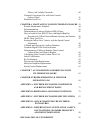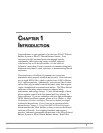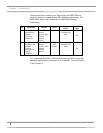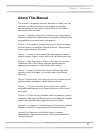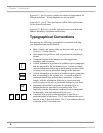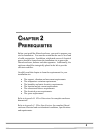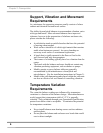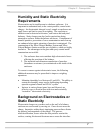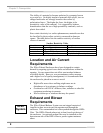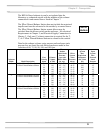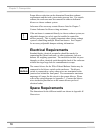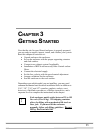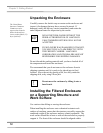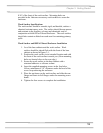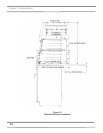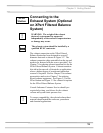
8
Chapter 2: Prerequisites
The ability of a material to become polarized is a property known
as permittivity. On highly insulative materials like acrylic, ions or
charged molecules are strongly bound to the surface by
polarization forces. The higher the force, the higher is the
permittivity value of the material. It is suggested by balance
manufacturers that the use of high permittivity materials, such as
plastic be avoided.
Since static electricity is a surface phenomenon, materials can also
be classified by their surface resistivity measured in ohms per
square. The table below lists the surface resistivity of various
classes of material.
Surface Resistivity Table
Material Surface Resistivity Example
Conductive
0 → 10
5
Ω per square
Skin, Metals
Static dissipative
10
5
→ 10
9
Ω per square
Glass
Antistatic
10
9
→ 10
12
Ω per square
Polyethylene bag
Insulative
10
12
Ω per square→
Acrylic, Packing foam, Styrofoam
Location and Air Current
Requirements
The XPert Filtered Enclosures have been designed to contain
hazards by negating typical cross drafts and turbulence within the
opening. Air movement does not affect most modern balances
with draft shields. However, as a precautionary safety measure
and a higher level of quality management, it is recommended that
the enclosure be placed in an area to avoid:
• High traffic areas where walking might cause an air
disturbance or be a nuisance to balance readings.
• Overhead or wall HVAC diffusers, fans, radiators or other lab
equipment producing air currents.
• Next to doorways or windows that may be opened.
Exhaust and Blower
Requirements
The XPert Filtered Balance System uses an integral motorized
impeller to draw room air past the operator and through the
enclosure. This contaminated air is then pushed through the HEPA
filter. The HEPA-filtered exhaust air is then forced out the top of
the enclosure. An optional carbon filter may be installed on the
downstream side of the HEPA filter to protect against nuisance
odors.
XPert
System



